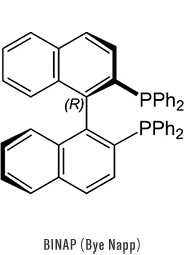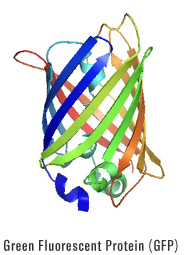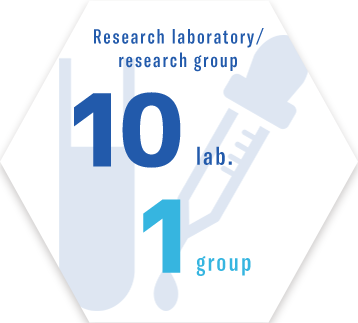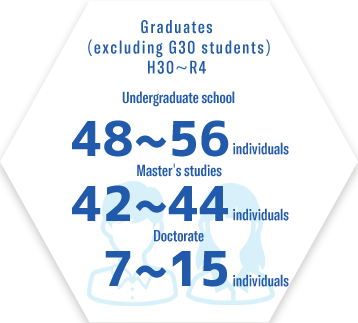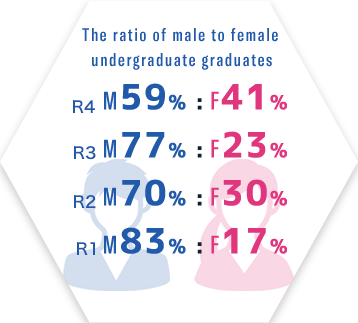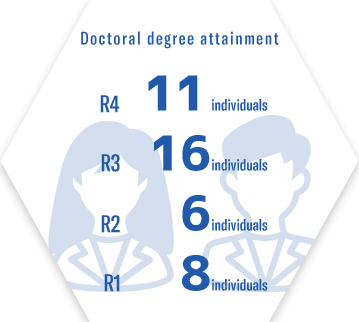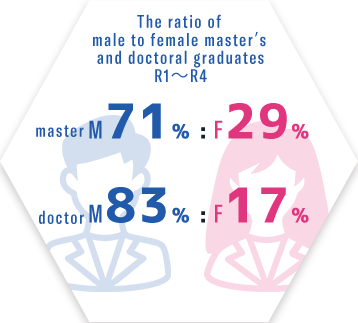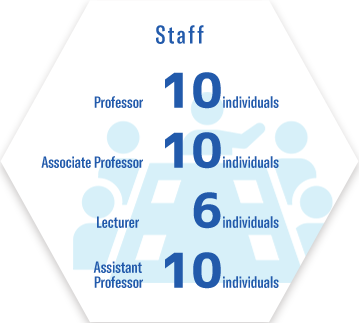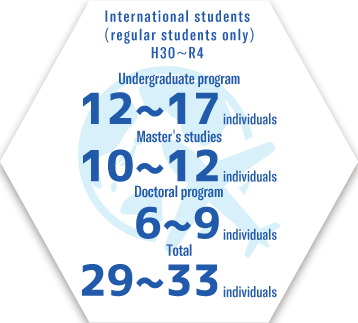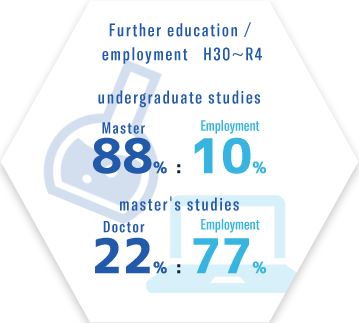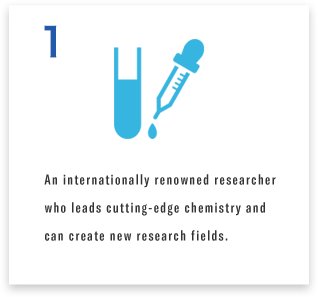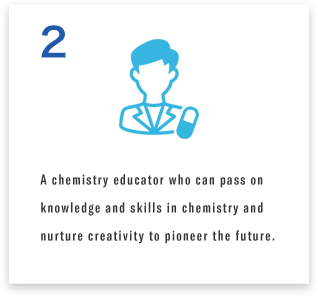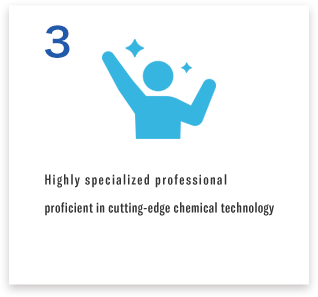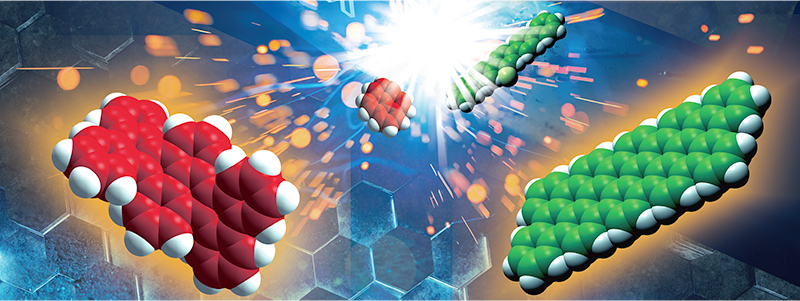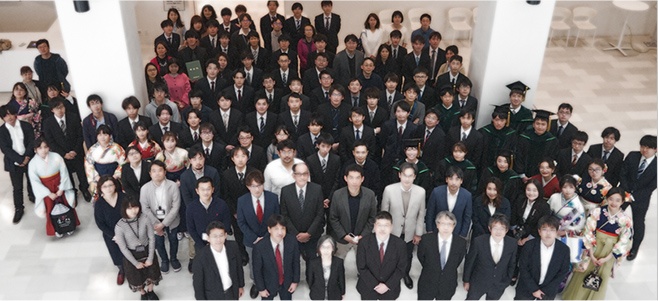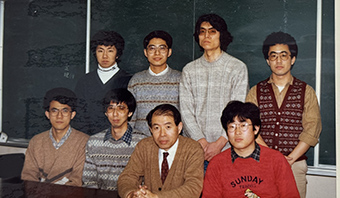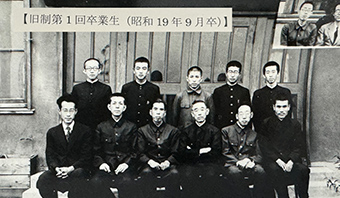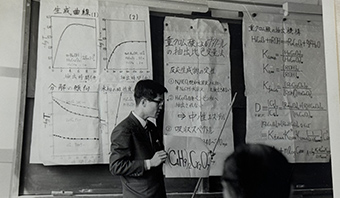Chemistry is often referred to as the ‘central science’ [1], bridging diverse fields of science. The Department of Chemistry at the Faculty of Science and Graduate School of Science at Nagoya University (hereinafter referred to as the Chemistry Department) conducts education and research spanning various scientific disciplines. Modern chemistry encompasses a wide academic field, including the creation and exploration of properties of compounds with new structures and physical properties, elucidation of the structure and reaction mechanisms of biomolecules, and synthesis of bioactive substances, expanding the horizons of both material and life sciences. The Chemistry Department has assembled researchers who are internationally active in their respective foundational fields as faculty members and has established a cutting-edge research and educational environment.

[1] T. L. Brown and H. Eugene, “Chemistry: The Central Science”
It’s a bit different from the image of chemistry we learn in high school, isn’t it?
You can scientifically study various substances by fully utilizing many foundational disciplines and technologies.
It seems like a wide and interesting world! Science has strong connections to our society, doesn’t it?
Understanding, creating, and controlling matter. That’s the power of chemistry! I hope you’ll enhance your problem-solving skills in the chemistry department and take on challenges!
The Chemistry Department primarily utilizes three splendid buildings, all located within the Higashiyama Campus and adjacent to each other. The research laboratories are housed within these buildings, providing a well-equipped research environment.
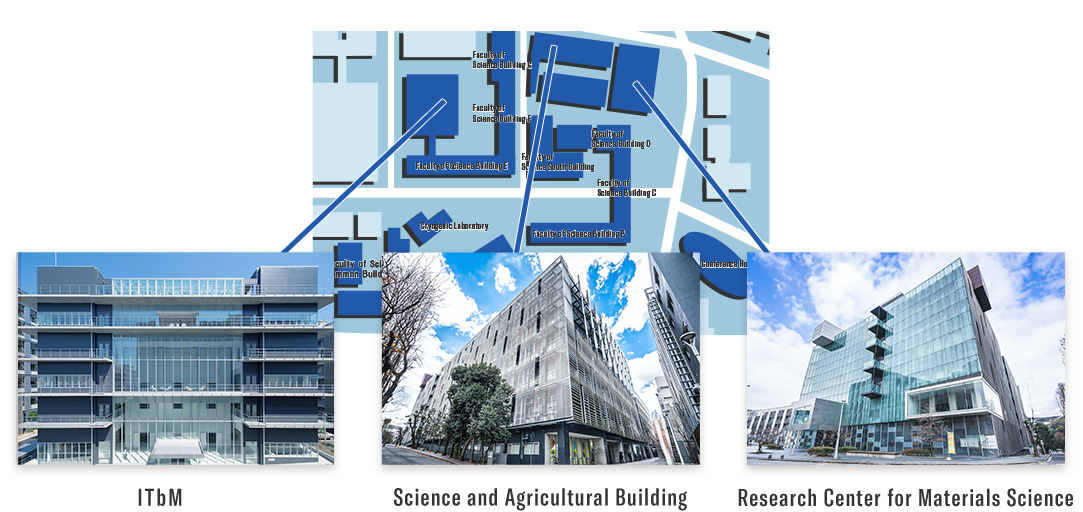
Completed in 2011, 6 stories

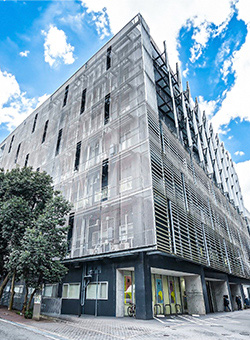
This is the flagship building of the Chemistry Department, housing six laboratories. It also includes the chemistry office and a student laboratory for third-year undergraduate students.
Completed in 2004, 7 stories
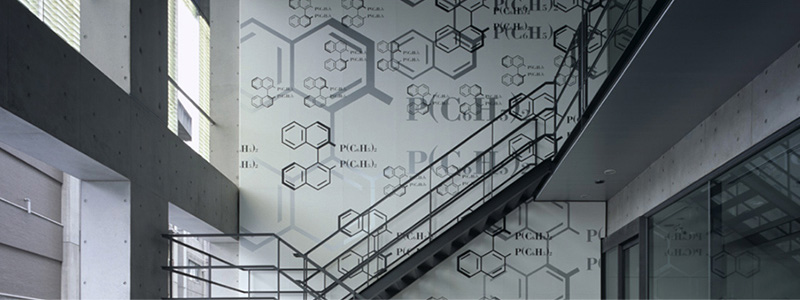
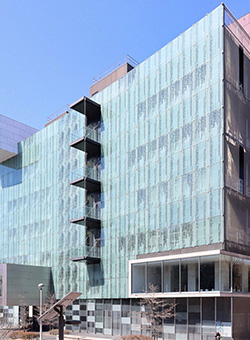
This is a research center commemorating Professor Ryoji Noyori’s Nobel Prize. It is a stylish building with a glass exterior and exposed concrete, capable of accommodating 120 people in its lecture hall. It also features a chemistry lounge for poster sessions and other events. Four laboratories of the Chemistry Department are housed here. It is used for graduation thesis presentations and research conferences.
Completed in 2015, 6 stories
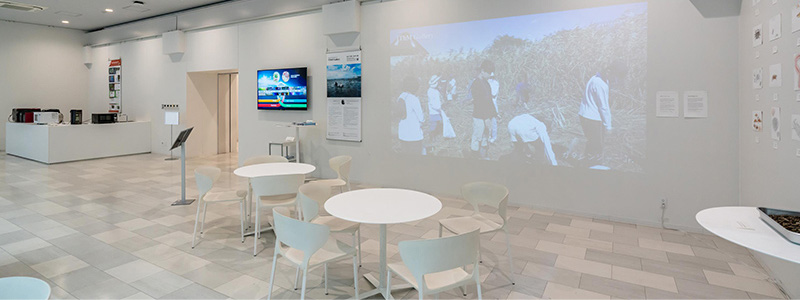
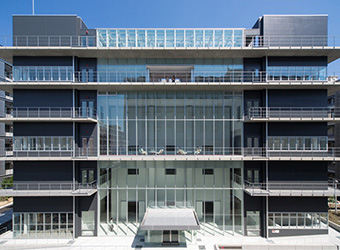
The Institute of Transformative Bio-Molecules (ITbM) was established at Nagoya University as one of the World Premier International Research Centers (WPI). It is the newest building among those related to the Chemistry Department. Serving as a stage for cutting-edge fusion research in synthetic chemistry and biology, it promotes world-class research. Three laboratories of the Chemistry Department are located here.
化学は物質の科学です。物質によって⼈間社会・経済活動は成り⽴っています。従って、化学の知識や技術は社会へのコミットに必ず関わります。
さらに、サイエンスの先端を追求する⼤学の化学は、修得には広く深い基礎学⼒が必要になります。その修学には、⾼いレベルの思考⼒や発表⼒を養うことが可能です。この基礎⼒は、今後の⻑い⼈⽣で、様々な局⾯で活躍するでしょう。精進あるのみですが、化学は物質科学の奥深さ、不思議さ、達成感を感じる学問で、多くの多様な知的な刺激を受けることができるでしょう。
化学科の研究室には、化学と⽣物の複合領域を⾏っている研究室は数多くあります。アプローチも様々です。化学はセントラルサイエンスとも⾔われ、他分野との融合研究が⾃然に⾏われます。
当学科に進学することがあったら、授業終わりに講師に声をかけるなどして話しをきくのはどうでしょうか。
⻭ごたえがありますが、論⽂を読むのが最も詳しく研究内容を知ることができる⽅法です。
化学科の多数の研究室が企業と共同研究をしています。会社は様々です。研究によっては、学⽣が参加することもあります。
研究室に配属できるのは4年⽣からです。4年⽣への進級には3年⽣学⽣実験の単位を取る必要があります。研究室で安全かつ適切に研究をするための基礎訓練を⾏い、レポートのまとめ⽅を修得します。
薬剤を中⼼とするわけではないですが、関連する内容を学びます。特に、有機化学、⽣物化学、計算科学などは医薬品の開発においては⾮常に重要であり、関連した授業があります。また、卒業研究や⼤学院での配属では、医薬品開発の基礎となる技術や、⽣理活性を⽰す化合物の開発を研究している研究室があります。また、製薬会社の創薬ビジネスが昔とは形態が異なってきていることにも注意しましょう。薬の開発には博⼠レベルの知識や技術を持った⼈材が必要とされています。
⼯・化学⽣命⼯学科と理・化学科は化学を、⽣命理学科は⽣物学を中⼼とした学科になります。また同じ化学を対象としてますが、⼯学部では中で有機化学、物理化学、⽣命化学などからなる3つの分野・専攻に分かれているのに対し、理学部化学科は有機化学、無機化学、物理化学、⽣命化学を専⾨とする研究室が1つの学科・専攻内に集まっていることが⼤きく違う点として挙げられます。
理学部化学科と⼯学部化学系のカリキュラムはホームページなどで確認できますが、大学の化学の基礎をきっちり学ぶという点では大きな違いはないでしょう。化学教室の教員も理学部出身と工学部出身さまざまです。ただ,理学部は系統的なカリキュラムを提供できるように心がけています。
就職活動での進路就活が理学部の化学出身か工学部の化学出身かで違うということは現状はありません。高校の先生が有利不利をおっしゃっていたら、それは化学の現状では当てはまらないと思ってください。
理学・化学教室の恵まれた環境を活かし、如何に知識や思考⼒、発表⼒、学部・修⼠レベルの問題解決⼒を獲得・修得できるかが⼤⼈としてのポテンシャルを決めると考えています。改めて断ることでもないかもしれませんが。
私の知っている限りでは、例年2名程度です。⾔えることは、理学部から化粧品会社の研究開発職に就くことは可能です。私⾃⾝、⾼校⽣の頃から化粧品業界を⽬指してこの学部に⼊学しました。実際に就活を経験し、化粧品業界に関しては(化粧品研究に直結する学部がないので)理学部・⼯学部・農学部・薬学部出⾝と⾨⼾が広く、学部による優位性は特に無いように感じました。
製薬会社や化学メーカーに⽐べて、化粧品会社の研究開発職は採⽤⼈数が少ないです。ただ、化粧品業界を志望する⼈も実際に就職する⼈も、理学部全体としては相対的に⼩さな割合です。 (回答者︓修⼠2年⽣)
化学科に関しては、化学という学問の性質上、「理学=社会と解離」という図式は当てはまりません。理学的な目線で真理・道理を追求できるという卓越した化学人材は先端的な企業・スタートアップで引く手あまたです。アカデミック・学者への道も目指せるでしょう。もちろん、どのケースでも学問や研究に没頭した結果ととしてです。
博士号の取得者とは、自分自身で問題に着目・発想し、課題解決のための研究を行い、論文発表・プレゼンにまで結び付けられる能力を獲得したと認められた人のことを意味します。学位であって、資格とはやや意味がちがうものです。研究室での研究をこなしながら研究力を高めていくことで、博士研究者・専門家としての能力を獲得していきます。各研究室ではそのための教育・トレーニングが施されます。実際学生は、研究の進展の1ページ1ページを噛みしめながら、こつこつと自分の力を積み上げていきます。そして修士を含めると5年の研究生活で実力をつけて大きく育っていきます。このような積み上げができるのも研究の楽しさややりがいを感じ、研究に没頭できるからです。とはいえ博士号取得は研究者人生の始まりです。それ以降もキャリアに磨きをかけていきますが、実力が備わっていればこそ次の成長に繋げられると言えるでしょう。
現在,学術・産業分野では知識・技術の高度化・細分化が進み、イノベーションを生み出せる博士号を有する人材は、その重要度と付加価値をますます高めています。博士号は世界でも通用します。例えば、博士研究員として海外の研究機関で働くポジションに手を上げることができます。企業でも研究開発のコアに携わたいのであれば博士号は必須と言えるでしょう。博士号取得する優秀な研究者は、先端的研究開発を行いたい企業に引く手あまたであり、将来リーダー的人材になっていくでしょう。化学教室も博士育成を重要なミッションと捉え、充実した教育環境を整えて、予算獲得や他では見られない試みにも取り組んでいます。
教員免許状は取ることが可能です。
理学:理科
⼯学:なし
名⼤の関連HP「取得できる免許状/資格」
理学は教員になる学部というふうに捉える高校生が時々いらっしゃいますが,それは誤解です。卒業生の進路をみると分かりますが,多様な分野の会社,研究職など,様々な将来の方向で卒業生は巣立っています。卒業生の中には教員免許のための単位を余分に取得しそれを活用して一選択肢として学校教諭の道を選ぶことができています。
To understand the reality of the Chemistry Department, the best way is to answer questions from prospective students. Here, members of the Chemistry Department have provided answers to questions from high school students applying to our department.
In a nutshell, the education in this department is characterized by thorough small-group teaching. Although the department’s capacity is 50 students, there are 35 faculty members. In the fourth year, there is a year-long special experiment where students are assigned to each laboratory and receive guidance on experiments. During this time, faculty members strive to provide education that takes advantage of each student’s individuality, making it an easy-to-learn environment for motivated students. We take pride in the fact that this educational system contributes to the high social evaluation of our graduates.
In my third year, I had a lot of experimental work and writing reports was tough. However, since being assigned to a research laboratory in my fourth year, I have been able to study with peace of mind because the education and research guidance there prioritize autonomy.
Another feature of the Chemistry Department is that its research environment, facilities, and achievements exceed international standards in every aspect. I think it provides a favorable environment for students who want to delve deeply into the study of chemistry.
That’s a misunderstanding. In university lectures, fundamental concepts of chemistry, such as molecular structure, are introduced early on, which is quite different from high school chemistry. In any field today, you need to build your studies from theoretical foundations to progress. Even after entering university, studying a wide range of subjects including physics, mathematics, biology, and earth sciences, in addition to chemistry, is necessary.
In studying chemistry, it is important to experience various experiments, observe closely what is happening, and think deeply about it. This applies to all fields of natural science, but it is especially true for chemistry. I think that even in everyday phenomena, there is often significant scientific significance behind them. In chemistry, it is not uncommon to discover unexpected new facts or to come up with new ideas while conducting an experiment.
The Faculty of Science approaches research and education from the standpoint of laying the foundation of academic knowledge.
In today’s world where the “crisis of the global environment” is being seriously discussed, there is no doubt that broad-based fundamental research is important. Sometimes, we must question what is taken for granted. The warning about the dangers of “CFCs” arose from sharp insights based on diligent fundamental research. I believe that the role played by the Faculty of Science, which is responsible for fundamental research in chemistry, is significant for the advancement of academic knowledge.
Many students express a desire to continue their studies in chemistry because they want to pursue research and become researchers after graduation. To be honest, it can be difficult for some students to find the right path for themselves by the time they reach their fourth year of undergraduate studies. It is not uncommon for students to only realize their aptitude after entering graduate school, which I believe is a healthy process. At Nagoya University’s Faculty of Science, students are assigned to departments at the end of their first year. I encourage you to make decisions about your future path based on your own judgment, rather than being influenced by public opinion or external noise. It’s never too late to decide. Isn’t it a privilege of ‘youth’ to spend a considerable part of your life struggling with decisions? I hope you make decisions that you won’t regret later as you experience a significant part of your ‘youth’ for the first time. Regardless of the field you choose to specialize in, always remember that there is room to develop your abilities and potential.
In the Chemistry Department, there are professors, associate professors, lecturers, and assistant professors from the Department of Material and Life Chemistry in the Graduate School of Science, the Institute of Materials and Systems for Sustainability, the Institute of Transformative Bio-Molecules, and the Institute for Advanced Research in Materials Science, as well as graduate students (master’s and doctoral students) and research students, and undergraduate students (2nd to 4th year).
Education and research in various fields of chemistry are conducted by 10 laboratories and 1 research group of faculty members specializing in molecular and structural chemistry, inorganic chemistry, bioinorganic chemistry, organic chemistry, functional organic chemistry, special, bioorganic chemistry, photo physical chemistry, physical chemistry, and quantum chemistry.
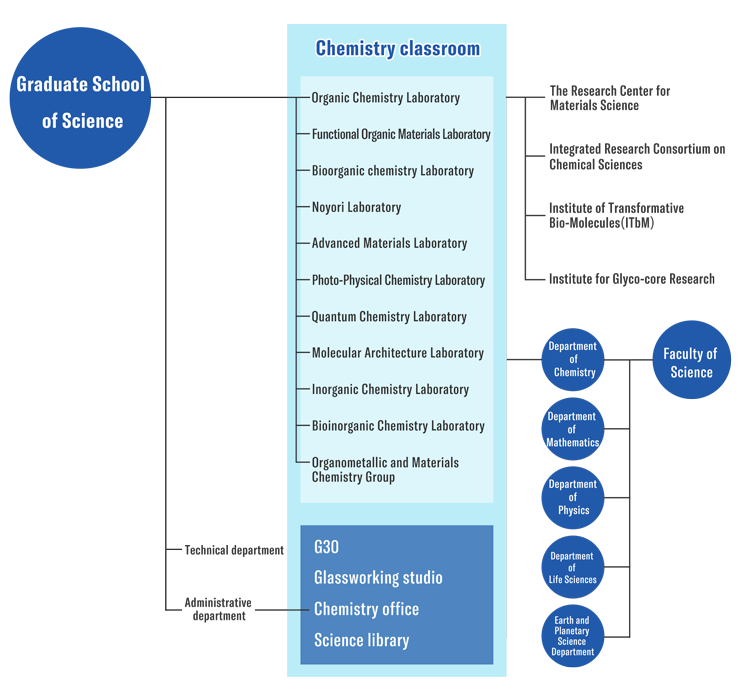
Each laboratory in the Chemistry Department is operated in close collaboration with the Institute of Materials and Systems for Sustainability and the Institute for Advanced Research in Materials Science, in both research and educational aspects. In addition, there are support organizations for the laboratories and groups, such as the Chemistry Office, the Science Library, the Glass Workshop, the Chemical Measurement Equipment Room, and the G30.
In the chemistry department, we conduct various education and research activities funded by external sources.
In the fiscal year 1998, the Chemistry Department led the establishment of the Center for International Research in Material Sciences. This center was founded with the aim of creating new materials and elucidating their functions. It conducts research activities primarily in five fields: organic material synthesis, inorganic material synthesis, material function research, life material research, and molecular catalysis research, with a focus on the chemical measurement equipment room.
link: https://www.rcms.nagoya-u.ac.jp/english/
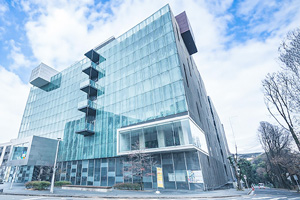
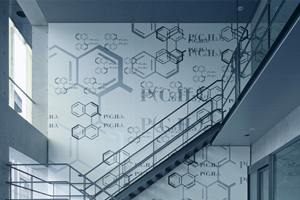
The Institute of Transformative Bio-Molecules (ITbM) was selected as a World Premier International Research Center Initiative (WPI) program in the fall of 2012 and launched as an international research hub. ITbM has established Mix Labs and Mix Offices, removing barriers between fields and laboratories, and researchers leading the world in the fields of synthetic chemistry, plant science, animal science, and theoretical science have come together under one roof with the slogan “Changing the World with Molecules”. They are working on interdisciplinary research beyond the boundaries of existing academic disciplines, aiming to create transformative life molecules that will greatly change our lives, and are excitedly engaging in research every day.
link: https://www.itbm.nagoya-u.ac.jp/en/
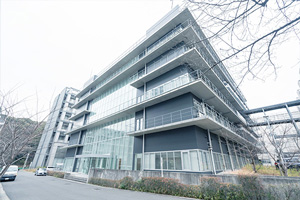
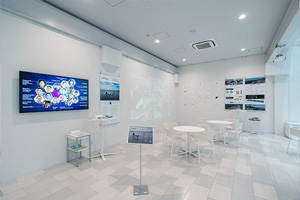
In the fiscal year 2022, a research organization was established with a focus on chemistry laboratories, collaborating across Hokkaido University, Kyoto University, Kyushu University, and Nagoya University, which has strengths in material creation chemistry. This organization includes research institutes from the four universities (Nagoya University Institute of Transformative Bio-Molecules, Hokkaido University Catalyst Science Research Center, Kyoto University Institute for Chemical Research International Center for Element Science, Kyushu University Institute for Advanced Materials Research) as its core, with a total of 120 researchers participating. Establishing such a large-scale, cross-university organization at one university is a first for Nagoya University. In addition to pioneering fusion frontiers and nurturing young talent, it also has a social contribution aspect of returning the results to related fields and industries through collaboration.
link: https://irccs.nagoya-u.ac.jp/
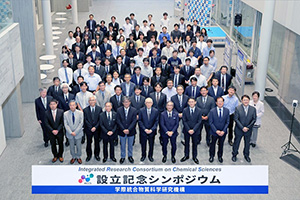
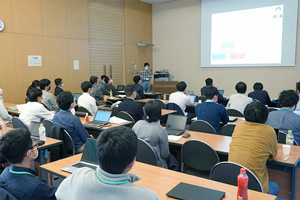
For the sustainable development of society, there are many challenges to overcome, such as solving environmental and energy issues, ensuring stable food production, material creation leading to industrial technological innovation, and life sciences contributing to health. The role of chemistry and life science research is becoming increasingly important. To make breakthroughs in these challenges faced by society and science, it is necessary not only to advance research in each field but also to pioneer fusion areas between different fields and open up new horizons. The Transformative Chemistry/Life Fusion Research Graduate Program (GTR) aims to cultivate researchers who can “pioneer fusion frontiers and create future knowledge” in the fields of chemistry and life sciences through a five-year integrated doctoral degree program. In addition to covering a wide range of basic and advanced coursework, the program includes English training, various seminars, retreat camps, and other activities to develop advanced expertise, broad knowledge, and comprehensive research skills necessary to advance research. As a unique initiative, it proposes fusion research projects and provides a platform for realizing true research breakthroughs by conducting them in interdisciplinary environments under the guidance of mentors from different fields.
link: https://www.itbm.nagoya-u.ac.jp/gtr/en/
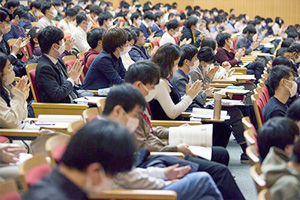
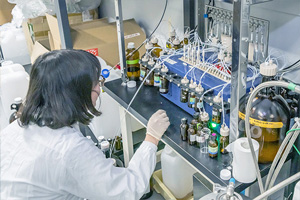
Glass Workshop (Graduate School of Science, Technical Section)
The Glass Workshop manufactures original instruments and devices tailored to research objectives that cannot be achieved with general items such as beakers, flasks, and test tubes through close communication with researchers. Additionally, it conducts glass practical training for third-year chemistry students and summer glass practical training for young researchers to contribute to education on acquiring basic knowledge about glass. The glass processing technology is top-notch nationwide, supporting education and research at Nagoya University, including the chemistry department, based on various technical exchanges and information exchanges.
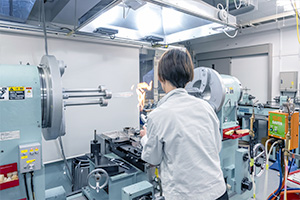
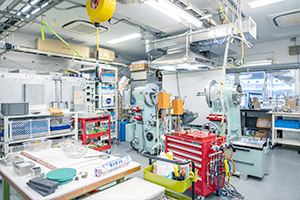
Science Library (Graduate School of Science, Administrative Section)
As a branch of the Nagoya University Library, the Science Library focuses on collecting and managing electronic journals, books, and other materials related to science. It provides a wide range of books not only for research but also for students’ studies, including textbooks and reference books. Additionally, it offers evening hours to improve convenience for faculty, staff, and students.
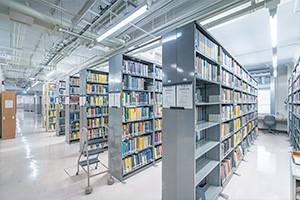
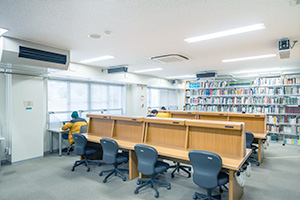
The research laboratories in the Chemistry Department aim to educate and cultivate individuals with intellectual curiosity to unravel the principles of substances and nature, as well as with the ability to explore new materials and properties and elucidate the principles of nature through innovative thinking and flexible reasoning. Our educational goal is to nurture individuals with a wide range of knowledge in natural sciences, as well as specialized foundational knowledge, research execution capabilities, and research dissemination skills in various fields of chemistry.

